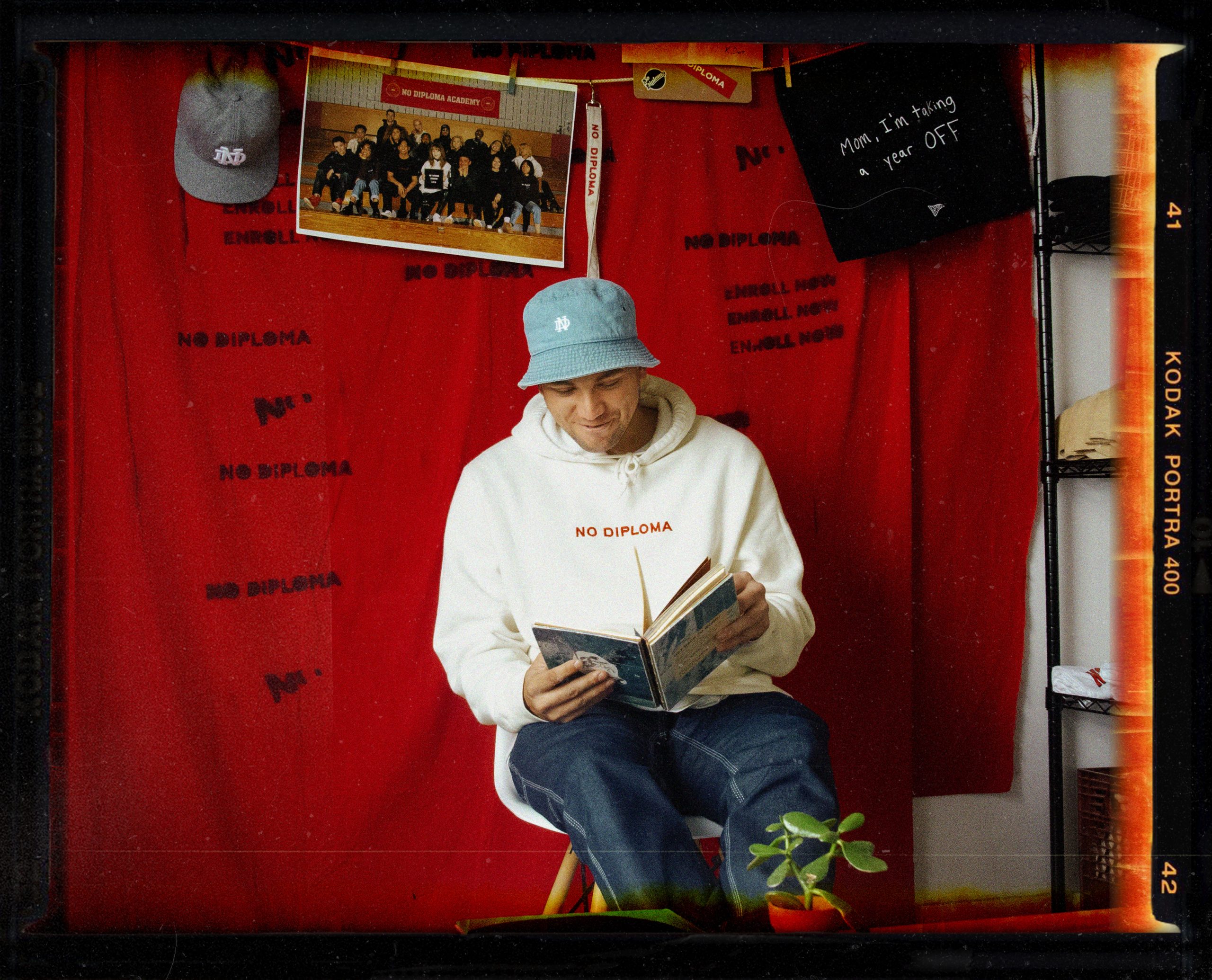A brand that promotes following one’s own path
You may recall seeing a sticker of the brand on a street light, or their logo on someone’s T-shirt. Either way, No Diploma stays with people.
Montreal-based streetwear brand No Diploma was created three years ago by Benoît Brûlé. Originally from Ottawa, Brûlé enrolled at LaSalle College in 2013 where he studied Fashion Design. While participating in various internships, Brûlé discovered that his learning was more fulfilling when working with brands than it was in class.
“Every project [in school] was by the book, whereas I was more interested in creating my own projects with my own expectations,” said Brûlé.
After two years of being enrolled in fashion school, Brûlé went on a solo trip to Asia during the summer break to look for inspiration. The trip made him regain confidence as he was confused regarding what to pursue within his professional life.
“Traveling alone helped me connect with myself and my interests,” he said.
After his trip, he returned to Montreal with no diploma, leaving fashion school after two years, wondering what to do next.
Brûlé applied for internships and quit after two weeks to work with one of his favorite brands. While working for the brand for two years, he had the opportunity to understand the work behind a brand and how it is built. Brûlé even got to attend fashion week in Toronto.
“These brands were my school,” he said. “The people with whom I worked were like my teachers.”
While working as an intern, Brûlé created his own clothes on the side as a way to explore his own storytelling. Similarly to music, where a person gets to tell a story through a song, clothes are like different canvases where people can express themselves with various patterns and fabrics.
“No Diploma” are two words that resonated with Brûlé. He remembers printing the words on a T-shirt, which made him feel like he was wearing a superhero cape.
“There is a bad perception of people not having a diploma,” said Brûlé. “Those words were used against me and were once an insecurity of mine until I gave them a new meaning.”
He started wearing the shirt he had printed which sparked conversations with strangers, who would share their own stories about not having a diploma but who nonetheless achieved dreams such as owning businesses and building brands.
Brûlé made a few “No Diploma” T-shirts and hoodies and gave them to family and friends. Brûlé sold his made t-shirts to customers. Brûlé once met a guy at a coffee shop to whom he was going to give a T-shirt that he made. The person turned out to be a manager at a store where Brûlé used to work.
“I sold the T-shirt, I got back into my car and for me, that moment was a sign that I had to start my own thing. Beyond a t-shirt, this could be a brand,” said Brûlé.
The concept behind No Diploma is inspired by school — it’s been three years since the brand started, therefore, the brand is in its third semester.
“No Diploma was also inspired by me spending time in coffee shops and seeing people repping their university sweaters and college attire with so much pride, I wanted to create merchandise for an “academy” where everyone is accepted,” he said.
With No Diploma, Brûlé was able to build a community worldwide: people from Europe to New Zealand have reached out to the brand. People who support the brand and follow it are known to be classmates as they have become part of the brand’s family.
No Diploma has done a few fundraising projects, such as creating Photos for Australia to help the Australia Bushfires that occurred in January. The brand also raised over five hundred dollars for Black Lives Matter, donating the money to organizations such as Hoodstock Montreal and Nia Centre for the Arts, a Toronto-based arts centre that promotes arts from across the African diaspora.
Photo concepts and videos are shot to show the street wear for the online store and social media. For the last three years, there have been No Diploma pop-up shops around the city. In April, Brûlé was preparing for a pop-up show in Atlanta which was canceled due to the pandemic. Another one, which was also cancelled, was supposed to take place during the summer in New York.
Instead, Brûlé and his team organized a new podcast called “Class Discussions,” where they talked with artists from around the world during quarantine. Guests have included artist collective KidSuper from Brooklyn and Australian entrepreneur Yasmin Suteja.
“Whether it’s a career with no diploma or a career with a diploma, the important lesson here is to follow your path and staying true to yourself,” said Brûlé.
You can take a look at their shop here and listen to their podcast here.
Photo courtesy of Ana Lucia Londono Flores.
